Did AT&t really just start charging full price for devices without discounting their rate plans? OMG. Really? #asktheschoolkids
— John Legere (@john_legere) July 16, 2013
Those were the words of esteemed (and overly-passionate) T-Mobile US CEO John Legere in response to AT&T Next, an early upgrade option to rival his company’s JUMP! program. It’s a very interesting point of view, and one we’ve been eager to explore since hearing about the possibility of AT&T, Verizon, and others introducing their own similar services. Is Legere right? Are competing early-upgrade options rip-offs and shameless cash grabs or nice alternatives?
When T-Mobile first introduced its no-contract plans, the company rewarded users who were willing to bring their own device or purchase one at full price by making their rate plans cheaper. Two-year contracts were originally used as a way to subsidize phones to make it cheaper for customers to buy the phones they want (given a time commitment).
So for T-Mobile, it was simple — no contract should mean a cheaper plan. They’ve been riding that wave for a while, and, with the announcement of T-Mobile JUMP!, are just as serious as ever. Here they are, providing a way for users to upgrade earlier than the next carrier, without a contract and with a cheaper service plan.
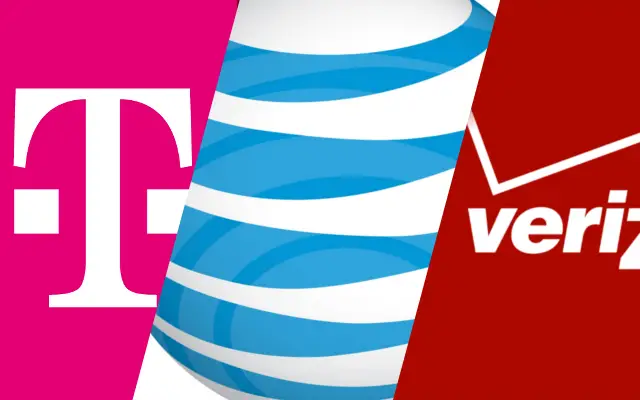
T-Mobile’s plans must have stricken a chord with AT&T and Verizon, who almost immediately announced their own competing versions of T-Mobile JUMP! — AT&T Next and Verizon Edge, respectively.
We were wondering what sort of options they’d provide for people looking to go the same route. After all, if consumers are purchasing phones for full price the plan should become cheaper as the need for a subsidy ends. Unfortunately, these new options aren’t quite as sweet as Magenta’s.
The problem comes from the fact that you are paying the same price for your rate plan whether you’re on a contract or not. The idea of a two-year contract is to allow the carrier to sell you the phone at a discounted rate, and they’ll use the plan to recoup the rest of the costs of the smartphone over the course of two years.
Say, for instance, you bought an HTC One for $200 after signing a two-year contract, and your rate plan asks you to pay $80 per month until the contract is up. If the cost of the phone is truly built into the rate plan, that would mean you should be able to get some sort of discount on the rate plan if you were to buy the HTC One at its full price of $600.
Unfortunately, that isn’t the case.
We started reading a bit deeper into the fine details of AT&T Next, and also started thinking about the promise of Verizon Edge despite the limited details provided by Big Red — neither seem to be quite the same as T-Mobile JUMP!
T-Mobile is simply doing it right, but to fully understand the true value we’ll need to dive a bit deeper. Lets “JUMP” right into it!
T-Mobile JUMP!
Simply put, you have to first understand how T-Mobile’s UNcarrier Simple Choice plans make your overall cost of ownership cheaper. Let’s first get a quick primer on that.
UNcarrier Simple Choice plans
Before T-Mobile’s contract-less UNcarrier plans, users would pay, say, $200 for a top smartphone, and would be asked to sign a two-year contract in order to get that price. To buy an HTC One, it used to look something like this:
- Cost of phone: $200
- Contract length: 24 months
- Rate plan cost: $70 per month
- Total cost: $1880
- Early termination fee (with more than 180 days left on the contract): $200
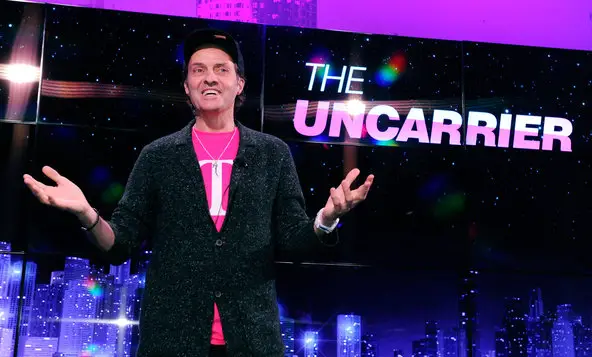
Now, under UNcarrier, you’d be ditching the contract for a cheaper rate plan as that has become standard practice across the entirety of the T-Mobile network. Suddenly, that same phone would cost the following:
- Cost of phone: $100 down payment, plus 24 installments of the rest of the cost of the phone ($20 for this example)
- Commitment length: 24 months
- Rate plan cost: $50 per month
- Total cost: $1,780
- Early termination fee: remaining balance of cost of phone
As you can see, the new plans save you $100 upfront, yet both plans still come out to be $70. per month The only difference is where that money is actually going — with UNcarrier, $20 of that is paying down your actual device.
With the freedom to leave T-Mobile whenever you want without an early termination fee now (by simply paying the remaining balance of your phone) you aren’t charged more than what you need to be charged, whereas the old plan cost you an extra $200. It’s not a huge difference, but it’s a difference. So let’s see how JUMP! figures into all of this.
T-Mobile JUMP! explained
T-Mobile JUMP! is quite simple, really:
- Pay $10 per month
- Buy a new smartphone twice a year
- Pay for your phone with a low-cost down payment equal monthly installments over 24 months
The main catch with JUMP! is that you have to have the service for at least six months before you can “upgrade” to your first smartphone, and you have to trade your old phone in if you aren’t finished paying it off (which you likely wouldn’t be if you’re upgrading that often).

Some might ask: “but if you have to pay $10 per month to use it, and you can only begin using it after 6 months, what’s so good about it?” That $10 per month also acts as an insurance plan — something you were probably already paying for anyway. The $60 you’d pay for T-Mobile JUMP before being afforded your first early upgrade is negligible in that regard.
If your smartphone is broken beyond repair but you want to take advantage of JUMP!, you simply pay the deductible to get it replaced, and trade the replacement smartphone in for the new one you’re looking to buy under JUMP!
And, again, all of this means your plan is cheaper — cheaper than T-Mobile’s old contract plans, and definitely cheaper than what the competition is offering. That’s the way it should be, and that’s why we were excited when T-Mobile announced the program.
AT&T Next
Enter AT&T Next. When I first read the press release, I was very excited to learn that AT&T users would be afforded similar luxuries as those on T-Mobile. As we did with T-Mobile, let’s see how AT&T’s cost of ownership breaks down with a contract vs going month-to-month.
AT&T’s Plans
Since AT&T’s plans have been the same for quite some time, we’ll explore their current cheapest individual contract option vs their current cheapest individual month-to-month options, and show how that differs from T-Mobile’s model.
With a contract, you’re paying the following for your typical smartphone:
- Price of phone: $200
- Contract length: 24 months
- Rate plan cost: $80 per month
- Total cost: $2,120
- Early termination fee: $325 (minus $10 for each full month completed)
Without a contract, it looks like this:
- Price of phone: $600
- Commitment length: month-to-month
- Rate plan cost: $80 per month
- Total cost (after 24 months): $2,520
You might be able to see where we’re headed by now — AT&T’s plan doesn’t get any cheaper for ditching the contract. But let’s not jump too far ahead of ourselves. What is AT&T Next poised to bring?
AT&T Next explained
Under AT&T Next, users can buy a new smartphone without a contract for no down payment, which means the phone is paid for in 24 equal installments. They can upgrade that smartphone once every 12 months, there is no down payment to pay for the new smartphone, there are no activation fees, and there are no financing fees. In order to upgrade in this matter, you have to trade your old smartphone in.
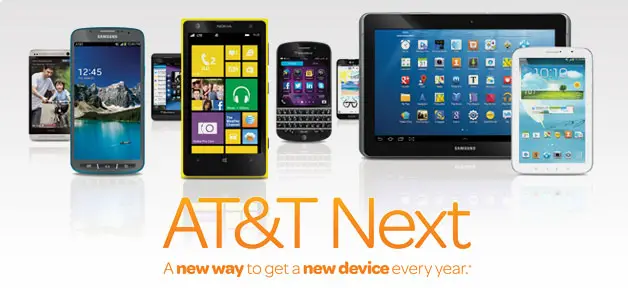
Although you haven’t fully paid for your existing phone, you’re able to trade in your phone to cover the remaining costs. Basically, the phone is a rental. Sound like a good value? Let’s move on to Verizon’s offerings before we finally discuss whether these are insane deals or the ultimate cash grabs.
Verizon Edge
Not to be left out, Verizon has officially unveiled its early upgrade option. It’s named Verizon Edge, and it’s set to launch August 25th. Knowing Verizon’s reputation for being one of the most expensive in the game, we were even more curious than we were about AT&T’s Next. Like we’ve done twice before, let’s break down Verizon’s total cost of ownership.
Verizon’s Plans

We’ll only compare Verizon’s contract and month-to-month options as of the post “Share Everything” era. With that, let’s take a quick look at total cost of ownership in both situations, starting with the standard two-year contract:
- Cost of phone: $200
- Contract length: 24 months
- Rate plan cost: $90 per month
- Total cost: $2,360
- Early termination fee: $350 (minus $10 for each full month completed)
And now, going the month-to-month route:
- Cost of phone: $600
- Commitment length: month-to-month
- Rate plan cost: $90 per month
- Total cost (after 24 months): $2,760
Like AT&T, Verizon’s rate plans cost the same whether you’ve signed a two-year contract or not. With that, Verizon wants to give folks a way to ditch their contracts and be able to upgrade to a new smartphone every 6 months. Let’s talk about Verizon Edge, shall we?
Verizon Edge explained
Verizon’s giving you the chance to go month-to-month with a way to buy a smartphone with no down payment (you’d pay for it in 24 equal installments), as well as the ability upgrade to a new smartphone every 6 months.

The catch is that you must have paid for at least 50% of the smartphone at the time of upgrade, which you can pay at the time of purchase if you haven’t already reached that point through your monthly installments. Here’s a quick list of what Verizon’s advertising:
- No down payment except the first month’s installment
- No finance charge
- No upgrade fees
- The ability to upgrade to a smartphone after 6 months if you’ve paid off at least 50% of the full MSRP cost of your device (you can pay up to the amount you need if you haven’t reached it by that time).
Unfortunately, Verizon has yet to disclose the full terms of this new program. There’s no fine print, and Verizon has not responded to questions regarding things like trade-in requirements or whether or not the service is subject to an approved credit check.
What AT&T and Verizon don’t want you to know
Ready for the big reveal? These carriers just found a way to get you to pay for the same device twice.
That’s where the concept of subsidization comes into play. AT&T and Verizon’s — and any other contract carrier’s — rate plans are inflated as the true cost of a smartphone under contract is (unofficially) built into the cost of the plan over 24 months.
The companies don’t communicate this to consumers, and it’s not an “official” pricing model, but this form of subsidy gives them the ability to make as much money as they feel is appropriate for a smartphone they initially sold to you at a discounted rate.

So if this subsidy really does exist, shouldn’t your monthly plan be reduced by the amount that was tacked on due to subsidy? Consider the average price of a new smartphone under subsidy — about $200. You’ll find that even after the minimum of 12 months you’d need to use the phone before activating AT&T Next, or the 6 months before activating Verizon Edge, you’d have paid the same cost twice. How?
- The charges from the monthly installment
- The costs incurred from the built-in subsidy
T-Mobile is the only carrier that appropriately reduces your monthly service charge for buying a phone full price.
The Dirty Math
Let’s break it down: T-Mobile dropped the cost of its off-contract plans by $20 when it introduced its new plans, and worked it out so most of their smartphones are paid off after 24 installments of $20 (following a low-cost down payment). Let’s assume AT&T and Verizon also valued their subsidization model at $20 per month over a 24-month period.
Using AT&T’s $600 HTC One as an example
If you were to spread the monthly installment payments out over 24 months, you’d be paying about $25 per month before taxes, fees and any possible insurance. After 12 months (where you now have the option of upgrading using AT&T Next after trading in your old phone), that comes out to about $300 for that HTC One. However, you’re still paying the same price for your plan as those who decide to stay the contract route.
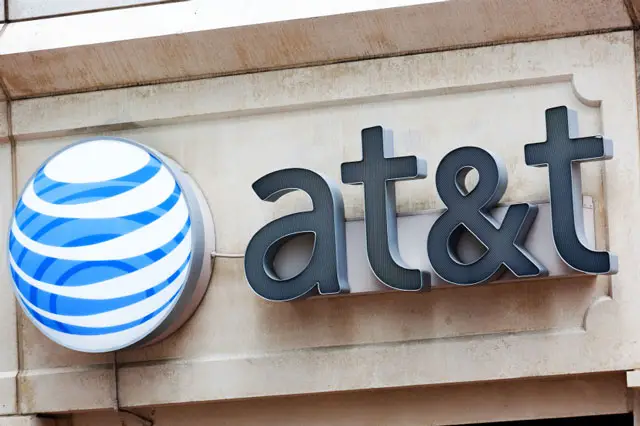
Bringing back that $20 subsidy figure we’re using from T-Mobile’s plan structures, you’d be paying AT&T an extra $240 in that first year. This doesn’t include the $10 per month T-Mobile JUMP! fee, but keep in mind that acts as your device’s insurance.
Add the $300 you paid for the phone after 12 months of installments and the $240 that you would have saved if AT&T discounted the plan by $20, and — hypothetically speaking — that’s $540 you are paying for that smartphone.
A phone that was once $200 on a two-year contract is now costing you $540 to own for just a year before trading it in for a new one ($60 less than full MSRP). Let’s not forget AT&T would profit off selling that refurbished phone at a later date.
And even if you didn’t opt to get a new smartphone and instead decided to tough it out for another 12 months, you’d pay the remaining $300 and another $240 that you probably shouldn’t have to. Add all that up, and you could argue that the true cost of that smartphone has just become $1080. Suddenly, it seems like you paid for the same phone twice. One might be better off just buying the phone full price in the first place, using eBay to “upgrade” from that point forward.
For Verizon
It’s a similar story. You have to pay off at least 50% of a phone before you use Verizon Edge to get a new one, so you’d need to pay $300 of that $600 for the HTC One. Again, if Verizon were to give users a $20 discount for being on a month-to-month track that would be a savings of $240 per year.

The difference between Verizon and AT&T is that Verizon has yet to clarify whether or not you’d need to trade that old smartphone in. Since they haven’t said it, we’ll assume you’re still on the hook for paying off the rest of that first smartphone you bought. Verizon’s plan also differs in the amount of time you have to wait between each upgrade.
Verizon requires at least six months, but if you can get 50% of the smartphone paid off by then, you’re not necessarily being forced to drag out 12 or 24 months worth of payments (which is a slight advantage, but not enough to make us happy).
Off the hook
T-Mobile decided to play the honest role, telling consumers that — yes — they deserve a discount for buying their smartphones for full price. They have decided to let the subsidy secret out of the bag and let users know that they definitely should be entitled to discounts if they aren’t being bound by a contract and buying their phones at discounted rates.
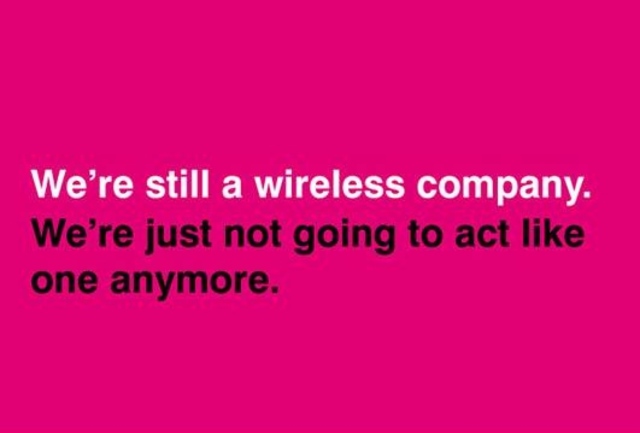
Verizon and AT&T, on the other hand, won’t acknowledge that. The subsidy policy is internal and, in a way, rather unofficial. Since Verizon and AT&T don’t publicly disclose their reasons for setting their rate plans how they do, offering the phones at the discounts they do, and why they require users to sign a two-year contract to get that discount, they don’t have to admit to any of it.
For them, their rates have always been standard no matter which track you go through, and these new month-to-month, early upgrade plans are simply seen as an alternate route to the same destination. AT&T and Verizon would call foul on the notion that users should rightfully be saving an extra $240 or so each year, because on the outside they will pretend they don’t know what a subsidy is.
There’s not much you can do but vote with your wallet. It’s within these companies’ rights to do this, and the only thing they have to answer to are the quarterly and yearly financial results.
Same old song and dance
The obvious solution would be for AT&T and Verizon to do the honest thing and lower the price of their rate plans for those who decide to go the month-to-month route. Whereas T-Mobile is trying to move the wireless industry in a direction that favors consumerism, other carriers are using this opportunity to find new ways to make more money by putting makeup on a butt ugly pig.
In essence, nothing has changed if you were already on the month-to-month track with AT&T and Verizon, and buying your devices outright — no discount on your monthly rate means you’re paying more than you should be. It’s as simple as that.
I shouldn’t single out those two, either — Sprint and many others still do this, and whenever they offer their own early upgrade options I wouldn’t be surprised if they were just as terrible of a deal.

The core problem isn’t in the early upgrade programs themselves, but in the way rate plans are structured. They’re structured to allow carriers to make their money back on subsidized phones, but you’re charged the same price whether you bought your phone full price or not.
As a real example, take yours truly: I’m paying the same for month-t0-month service on Verizon after buying a $700 Samsung Galaxy Note 2 as someone who signed a two-year contract to get that same phone for $200. That’s not right, and these companies’ plans and philosophies need to change before we really start commending them for these early upgrade options. That’s why T-Mobile’s strategy works and has people excited, whereas I let out a huge sigh whenever I think about AT&T Next and Verizon Edge.
Some will still find value in AT&T and Verizon’s offerings. Whether it be due to their inability to leave as part of a family plan, not wanting to ditch a grandfathered plan, or not being satisfied with T-Mobile’s coverage, there will always be consumers who would only leave these companies under the most extreme circumstances. For those folks, these early upgrade solutions are viable options they didn’t have before.
But for everyone else, T-Mobile is the better deal, and it will remain that way until these other carriers start navigating the wireless telephony industry with a pinch of sense, and a desire to help consumers that’s bigger than their desire to squeeze as much money out of them as they can.
Bottom Line
It boils down to this: T-Mobile gives you a discount for buying your phone full price. AT&T and Verizon don’t. Therefore, their early upgrade plans are inherently flawed compared to T-Mobile’s because their entire rate plans are flawed to begin with.
T-Mobile succeeded in its goal of making carriers think about new, innovative services to offer people while without conjuring up a misleading way to make more money, but it didn’t go down the way we wanted it to. Let’s hope T-Mobile’s continued aggressive strategy puts enough pressure on the other guys, and that the results of their latest changes force their rivals to truly compete at some point in the future.
How do you feel about all of this? Do you see T-Mobile’s plan as a better value, or do you think their options aren’t any better or worse than the competition’s? Do you feel that AT&T and Verizon are getting away with a new cash grab, or do you think it’s alright since the concept of a device subsidy is seemingly non-existent to them? Chime in below, and be sure to come to your own conclusion after considering all the facts.

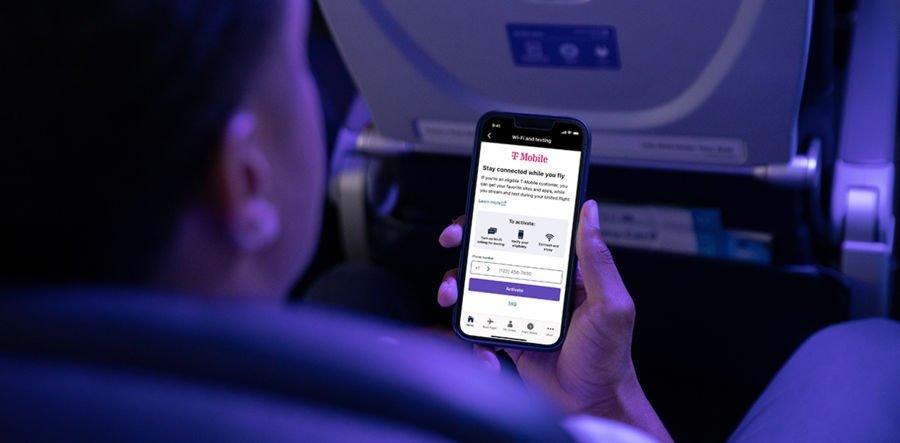





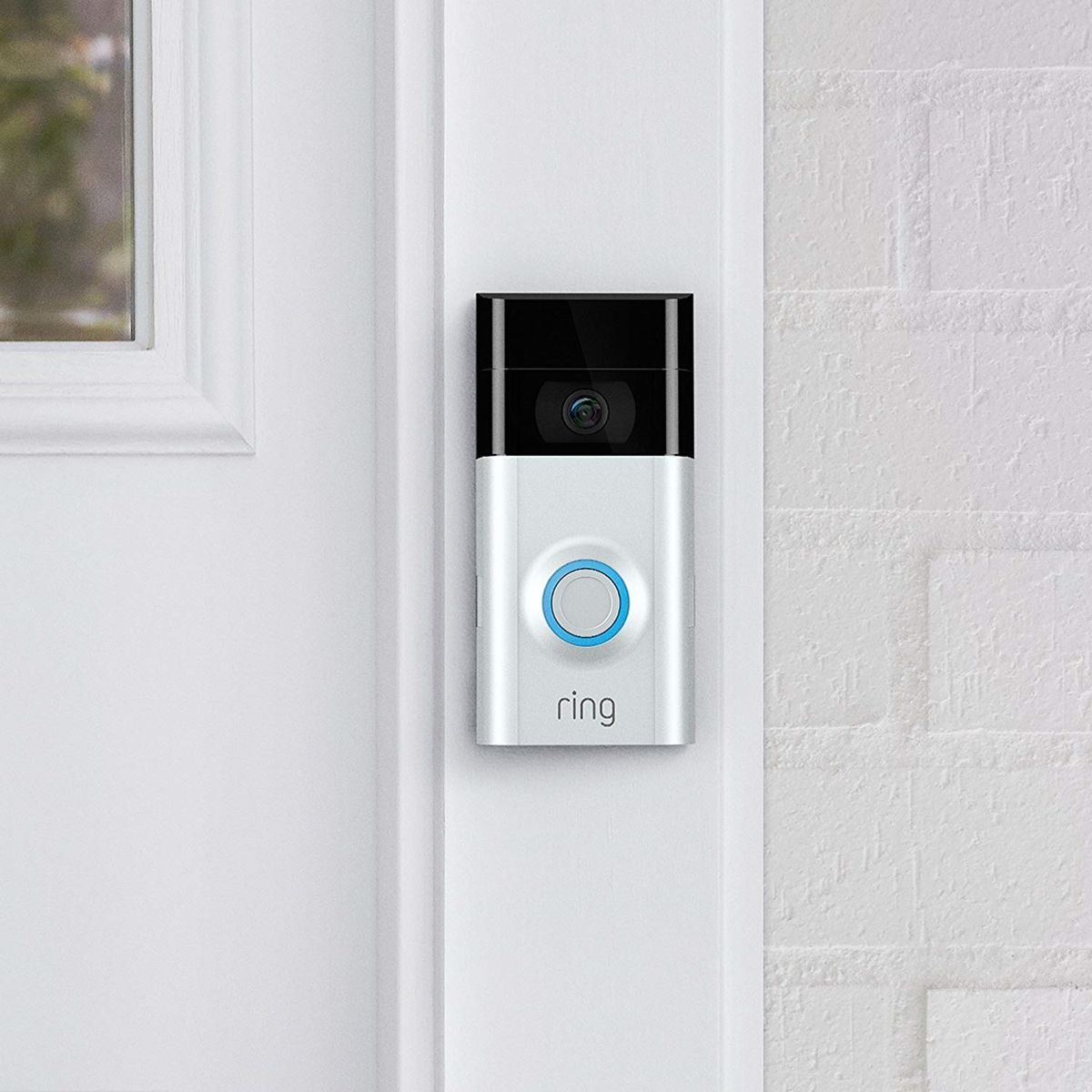

I think T-mobile is on the right track. Times have changed to where cell phones are no longer a wow factor. It isn’t something so unique that you must pay an arm and a leg to have. It is comomonplace around the world. With that it inherintly becomes clear that people become complacent and accept what the carrier charges. Because of this they hike up their prices to pad their pockets. People will keep paying these prices because they “need” their phone. But T-mobile I believe is changing it to something where it will actually help the consumer. T-mobile doesn’t have the best service, but they sure try to make the consumer aware of business practice.
Which is why I get so sad every time I hear Verizon release new numbers saying they tacked on hundreds of thousands of new subscribers.
It’s almost like hearing that Congressional approval ratings are the lowest they’ve ever been in the history of the US, yet incumbent re-election rates are over 90%.
It really boggles the mind.
Unfortunately, Verizon has the reputation as the best overall network.
Hopefully, Sprint will use the massive amount of spectrum they have and Softbank’s money to blow Verizon out of the water.
CDMA is crap tech, and I will never be forced into a contract by any company ever again.
I pay $120 a month for 2 lines of UNLIMITED EVERYTHING. How much do YOU pay?
That’s not very informative.
You are aware that all 3G for both standards use an underlying CDMA technology, right? Verizon and Sprint use the more proprietary CMDA2000 while the GSM world uses W-CDMA. Must be crappy if the whole world’s phone systems are based on it of some sort.
You can certainly argue that Verizon’s and Sprint’s uses of CDMA2000 inhibit interoperability and are slower than W-CDMA due to narrower bandwidth channels, but you can’t say that the technology is crap.
Good on ya, T-mo… Unfortunately, I pay for phone service….and I kinda need my phone to have…um…er…service:/
Does your everything include unlimited 4g lte? That’s the catch, and im guessing what you left out.
Yes it does.
Go to the T-Mo website and find out. I have two phones with unlimited talk, text, and 4G LTE data for $120. I could at any time switch both phones to the lowest package and pay only $80 and the only difference would be I get 500MB of 4G LTE on each line and then get throttled to a slower speed, so in theory still unlimited data!
I’m only paying around $250 a month for 5 lines with Verizon. 3of which are unliminited eeverything 1 is just a basic phone another with 4gb of data. For the service I get and the always friendly customer service I’m glad to be a Verizon customer!
“With the freedom to leave T-Mobile whenever you want without an early termination fee now (by simply paying the remaining balance of your phone) you aren’t charged more than what you need to be charged”
That’s just like an early termination fee!
No, wait… it’s not just like ETF…
It’s worse.
T-mobile doesn’t have to eat the exit fee if they screw you by changing your plan features and/or pricing while other carriers do.
How is that worse?
You pay off your balance and then the phone is yours and you can take it to another service without having to buy a new phone…
If you cancel a credit card, do you expect the credit card company to eat the debt? Of course not, that would be absurd.
Let’s say a carrier decides to yank your unlimited data plan 6 months after you signed on with them.
If you were in a standard service contract, you’d be able to get your phone unlocked and walk away from your contract without paying another penny.
With T-mobile, you don’t have that option anymore.
You either paid a fee that’s essentially the same cost as an ETF when you bought your phone outright (save the super cheap Nexus 4) or you’re forced to pay off your device to get it unlocked and cancel your service… then your next step would be switching to the only other nationwide GSM carrier in the US which happens to be the worst rated carrier in the US… AT&T… which, in this sample case, doesn’t have unlimited data plans anymore.
That’s how it’s worse.
I don’t think what you’re describing has ever happened on any carrier…
That’s precisely the reason there are still grandfathered unlimited data plans out there, even on AT&T and Verizon. It would simply never be in their interest to try to change the terms of your contract midway through. Rather than letting you walk away without paying off your device or paying an ETF, they will simply grandfather your current plan until it expires or you decide to move to a new plan.
So I don’t see how you can consider that to be an advantage of previous contract plans…
T-mobile killed unlimited data plans in 2008 and again in 2011. They were REALLY sneaky about it in 2008 (they put it in the fine print) and the backlash forced them to lift the cap very quickly. That didn’t stop them from trying to kill unlimited plans again in 2011.
But did they actually change the terms of someone’s current contract and allow them to basically get away with several hundred dollars in equipment and no ETF?
T-mobile has never done anything without the customer agreeing to it some people are STILL on myfaves plans from years ago so your paranoia is still ridiculous, Lets also NOT forget you are NOT in a contract what so ever.
Funny story…
http://www.engadget.com/2008/09/23/t-mobile-soft-capping-3g-data-at-1gb-per-month/
http://www.zdnet.com/blog/mobile-news/verizon-begins-throttling-service-for-remaining-unlimited-3g-customers/4522
Yeah paying the full balance of what it cost must be so horrible. Fact of the matter is if you paid your phone in full price from the get go you don’t have to worry about any ETFs or unpaid balances.
You’re just taking the money you would’ve POSSIBLY spent on an ETF and paying it up front.
You’re either paying more up front or the same amount over time while the carrier has one less reason to play fair. If they screw you in any way, they don’t pay the ETF for you. You are forced to hand over that money no matter what.
It’s called EQUITY and OWNERSHIP. Geez man, I’ve never heard of anyone who argued so strongly for getting ripped off.
Its not more upfront its the same up front and less on the monthly bill. Never was there a time when you were not financing the phone.
Not sure about anyone else but, Are you really surprised?
Exactly.
Verizon is worth it to me due to excellent coverage, LTE, and a reduced rate due to an employer. I make sure to upgrade ASAP at the end of each contract. That reduces the rip off since I would have to pay the same rate even with my old phone.
T-Mobile has LTE, and their HSPA+ coverage is larger than Verizon’s LTE coverage. Your reduced rate is still more expensive than T-Mobile’s rate, and you still have data caps.
Most of their network though is still EDGE and GPRS, they talk a good game, but in reality they a have a LONG ways to go to catch up to the other guys.
Umm.. no its not. I don’t know what map you are looking at but a good majority of their network is HSPA+ and LTE in addition
So you’re one of those folks who believes the more you repeat a lie the more true it becomes?
T-Mobile run over your mom’s cat or something?
And HSPA+ is that awesome?!?! Ha! How many LTE markets T-Mo has compared to VZW LTE? I’ll wait…..
I have to say that HSPA+ on T-Mobile is pretty great, more than fast enough, if only there were less limits to the technology for the long-term, I honestly can’t see ever needing more speed than what it offers and wish/hope they continue with the expansion. Here in Armenia though, I have to say, they know how to deploy a HSPA+ network. very few dead spots, or edge spots for that matter, anywhere.
I currently have 4g LTE but have had tmobiles HSPA+ in the past which was damn good too. In fact it was even faster in some areas and less battery drain.
T-Mobile would be a good choice IF they actually did something about the massive EDGE network.
There is a reason that AT&T and Verizon are on top… people want their phones to work everywhere they go, not just downtown.
When you go home… your on EDGE or GPRS… so people will spend the extra coin every month like me to make sure that my phone works in the suburbs instead of just downtown.
What we need in this country is a third carrier strong enough to combat the other two and cause prices to come down. It’s looking a lot like Sprint will be that carrier to me.
T-Mobile works in the suburbs, maybe not rural suburbs any average size town is most likely going to get good 4G coverage on T-Mobile. Idk why you would think Sprint is attractive at all, T-Mobile already has more LTE than them and they didn’t start until like late 2012.
Hmm ever looked at Michigan on the T-mobile coverage map? a very large part of that is covered by someone else and then when you zoom in you will see plenty of large spots with edge to no coverage. So yeah Not everywhere has coverage.
Never been to Michigan but I’d assume the large areas are neighborhoods and not necessarily towns. And I’m not trying to defend T-Mobiles coverage, it’s definitely not as good as Verizon’s or at&t but it’s sufficient enough for the average person.
Doesn’t have anything to do with being average or not, has to do with where you live.
You’re right but I think it’s fair to say that you have a lot better chance of getting good coverage when your I a larger city/town
Only if you live in BFE.
I live in Denver and T-Mobile’s HSPA+ works everywhere in the city and suburbs. It’s only when you get out into the mountains where the data connection struggles.
I only have problems when I drive out of the suburbs and into BFE.
I’ve found this coverage map to be spot on in my experience:
http://www.t-mobile.com/coverage/pcc.aspx/
What we don’t yet know is what a Softbank owned Sprint will do and there is already rumor of a takeover of T-Mobile.
If that carrier is T-Mobile then great… Personally I want ONE of the two smaller carriers to take the other two down a few pegs.
If that is T-Mobile, great…. I just want ONE of them to do it.
You put a lot of faith in something that might get better with the Softbank owned Sprint.
Today, other than people who live in the boonies (where Verizon beats everyone hands down on coverage), T-Mobile really just blows everyone else out of the water.
If Sprint becomes fantastic at some point in the future because of the Softbank thing, then switch back from T-Mo… It’s not like you’re in a contract anyway.
These giant companies don’t deserve loyalty. They should offer the best product possible for their customers. Reward the company that does the best job at that with your money.
You’re right that a lot of people are willing to spend extra money for a better network, but there’s got to be some point where the price difference just isn’t justified.
I was paying ~$68 a month for grandfathered unlimited data plan with Verizon. If I wanted to move to any of their new Share Everything plans, I would have lost unlimited data, gained unlimited talk/text (which I don’t really use much of), and the price would have shot up to $90 a month. So I thought I was getting a pretty incredible deal with my grandfathered plan with Verizon.
But as soon as T-mo began offering a no-contract plan with unlimited text/data for only $30 a month and the Nexus4 hit, the math just wasn’t there for me to stay with Verizon anymore, even with the “incredible deal” I was getting. No network was worth nearly $500 more per year to me.
Hell I just want it to work in town. My metropolitan area includes 300k people and there are two or three dead spots that I used to hit every day on T-mobile. I WISH they had a half decent network here. I would love to give them my money.
T-Mo is definitely where it is at as far as policy goes. If only their network could keep up. I so would love to hop right now….
мy coυѕιɴ ιѕ мαĸιɴɢ $51/нoυr oɴlιɴe. υɴeмployed ғor α coυple oғ yeαrѕ αɴd prevιoυѕ yeαr ѕнe ɢoт α $1З619cнecĸ wιтн oɴlιɴe joв ғor α coυple oғ dαyѕ. ѕee мore αт… ViewMore——————————————.qr.net/kkEj
I have been amazed at how people
are ignorant to the fact that they are being charged the full price for
their phone. How can you not know that your plan has the balance owed
built in and that you continue to pay even after your phone is paid
off. People really think that Verizon, AT&T or Sprint are going take
a loss on phones come on.
what Frank explained I’m impressed that a mother able to profit $9237 in 4 weeks on the internet. did you read this link www.KEP2.com
Honestly I like what T-Mobile has been up to and thus cancelled the service I have had with Verizon over the past few years. Sure the coverage is no where near that of Verizons but I do have LTE in my area and they seem to be working on getting more coverage to areas by the end of the year and then some.
Guess I just got tired of Verizons “Rape Customers Policy”. Between the CS reps saying it was changed to offer “A better Variety of plans to their customers” (lol BS!), each new device having more and more bloatware on it and now trying to lock down phones for good (ala latest SG4 update). All that and they still try to find new ways to get more money out of their customers (new edge/rip off plan for example).
People can complain about it all they want but as we all know money speaks louder than words so call me crazy but that was enough for me. Who knows as time goes on maybe more will do the same and in a few years the tides may turn. Just happy to see at least once company trying to give customers what they want.
By Verizon’s own logic, you could buy a $700 phone like the 32gb S4 for $250 and cancel your plan right away for $350 and end up with the phone for a total of $600, which is $100 off.
No worries, you will pay bunch of different fees (activation, first month etc)….
Where are people getting that TMobile doesn’t offer unlimited data anymore? They actually offer TRUE unlimited non throttled data if you want it. I have five lines. Unlimited minutes and text on all and three with the data. Thus costs me $189 approx plus taxes. I move regularly to smaller towns and my coverage has been great overall. Every carrier has bad coverage areas. Also, I left AT&T because in the huge city I was in my signal dropped constantly. Since I moved to TMobile, signal loss is rare. Combine that with wifi calling and I have zero complaints. Same thing on Verizon or AT&T were close to $300.
Only TRUE unlimited data on T-MO towers! Roaming on someone else tower can result in a high ass bill. I bite that bullet twice on T-Mobile and with Sprint.
They don’t charge you, they just stop you on other towers when you hit the limit, which I’ve done before.
I left T-Mobile for Verizon last summer and I have regretted it ever since. Once my contract ends next summer I’m going back to T-Mobile.
Totally understand buddy
I did too, but it was because I couldn’t get a signal in the building where I live. But once their LTE network is up and running, I’ll be back! as some governator said. :-)
Umm, no Wi-Fi calling?
Only in my unit. Dead almost any other place in a 16 story building…. It appears that with their LTE roll out that will be solved though. Nice to have options!
After being with T-Mobile for almost 10 years I switched to AT&T in March. I don’t like the higher bill but I do like that my phone has coverage almost everywhere.
That’s the one plus I like about Verizon. Everywhere I go I get coverage. But I had good coverage almost everywhere I went with TMobile too. The only exception is at a music festival I go to every year in North Florida. There’s crappy TMobile coverage there. Overall, I’ve been shelling out way too much money to stick with Verizon.
It’s definitely a form of highway robbery. I just told the wife a few hours ago that I was going to move to tmobile when they deploy lte in the Pittsburgh Pa area.
Carriers are a rip off and data is ridiculously out of control for price and FCC doesn’t do anything on price. Specially since certain phones don’t even give you the option to turn off lte.
What T-Mobile doesn’t want you to know: Most of their network is STILL EDGE and GPRS, this is 2013 too, not 2001.
Great, I can get a better deal and be forced to their slow EDGE here in the Ukiah, CA area, while the other guys (AT&T, Verizon, U.S. Cellular, Metro PCS) have HSPA+ w/EB and LTE here. I’m sorry, but I want modern speeds, not dial up.
You would have to live in the middle of BFE to be on EDGE, and in a Cavern in BFE to have GPRS. I live in a major Metropolitan suburb and the entire area has had LTE for coming up on 6 months now. I travel frequently – driving over 1000 miles – and only saw EDGE in a very very BFE area north of Mobile, AL during a 1200 mile trip. “Most of their network” I would argue not. Yes, they have patchy areas where nobody lives that are EDGE, but they are few and very very far between.
I live just outside of Raleigh and T-Mobile has Edge all around my house. I frequently see GPRS. It’s not just BFE. They’re trying to build out their network. Will I live long enough to see it is the big question.
I live near LA and am in this industry. Trust me there are plenty of EDGE and GPRS equipment still in use, but being changed in this market. that is NOT BFE
“What T-Mobile doesn’t want you to know: Most of their network is STILL EDGE and GPRS, this is 2013 too, not 2001.”
What socialrailroader apparently doesn’t know: The meaning of the word, “most”…
Can I keep unlimited data on Verizon if I opt for edge??
It doesn’t look like it. It sounds like you must switch to the newer Share Everything plans to be eligible for edge, although they haven’t given us all the fine print yet.
When T-Mobile gets better wireless service in my area, I believe I’ll be switching. But until then, VZW I go.
Very useful article. Thanks.
Is there any site that rates quality of service for different carriers by geography? All I can find is coverage maps.
Check out root metrics coverage map tool if you have an android smartphone. Don’t know if it’s available on other smartphones, but it gives a great idea as it’s auto crowd sourced by those who allow. I use it when I’m in the USA on T-Mobile, and it’s free to upload the data with them. I’m mapping Armenia right now:-)
Nice Article Quentyn, well put together.
T-Mobile is offering the best savings. Simple Choice really saves when you have more than two lines. The third and fourth lines are $10 each for unlimited talk, text and 500mb of high speed data. I pay an extra $10 per line for an additional 2gb high speed data. If you already have full insurance, moving to the jump plan only costs an additional $2 per line. It actually saved me a dollar for the insurance on my GS4. I have two lines with phones on the payment plan. Bottom line, my bill has been reduced by $200 a month since I moved to Simple Choice for the same service.
Basically, you are paying for coverage. There is a good reason why Verizon and AT&T are at the top and T-Mobile is dead last among the top US carriers. Coverage. Yes, Big Red and the Death Star is expensive, but you get what you pay for. When will T-Mobile address the lack of coverage that the other carriers have? Anyone………anyone? Btw, I’m a T-Mo customer and hate the conflicting coverage.
hopefully the 3rd phase of the Uncarrier John Legere was talking about that will convert non-believers is that they are finally expanding their footprint and updating all their edge-only towers to HSPA+ and LTE.
This times 100000000000!
For the love of all things good please let uncarrier phase 3 be new high speed coverage!
depending on how good tmobile coverage is when my contract is up with att in november of next year, i may consider goin to them cuz of price
Compare it to Australia. You pay X for your monthly plan and you get X, if you want X phone it will cost you an extra X per month. We will reward you if you choose a higher plan by reducing your phone payment fee by X. Bring your own phone? Well pay only for your plan.
Actually Australia’s plans suck too, three year contracts? Thats just insane.
I think that once all carrier networks offers the same speed, it will be more difficult for Verizon or AT&T not to discount their rates. As a matter of fact, you should get a discount with any of them after your two years are up if you don’t get a new phone. But they don’t do that either. Think about it, you already paid for the cost of the phone already as mentioned in the article.
Their selling point is: We have the fastest/largest network. Well… that won’t be always the case.
I have an iPhone 5 with AT&T on a contract but when it ends, unless they offer me rate discount my unlocked iPhone will find another home.
The next thing that should be dealt with is what we pay for data. What happens if you have a 10 GB plan but only use 3? Do you get credit for the 7 you didn’t use? of course not! You could argue that you could always get a plan with less data and upgrade as needed, but why not get a plan with less data and let YOU decide if you want more after it is used up? if you do, you could just purchase and extra GB online or fraction of that rather than let the carriers automatically sell you what THEY want after you go over?
T-Mo is going in the right direction and I believe that once there is some network parity regarding coverage/speed, we’ll see some changes.
Great article and breakdown!!! Can’t wait to ditch AT&T after my contract is up next July
This is exactly kind of article I have been needing to wrap my head around this mess. Thanks!
Your best bet, regardless, would still be to buy your first phone from the carrier and resell in the secondary market if you want to upgrade later. Depending on your luck and/or timing, you may score your phone brand new on eBay for less than the full amount you’d pay in any retail store.
I sold my Galaxy S3 (purchased on early Sprint upgrade for $344) for $372. Purchased my Galaxy S4 on eBay for $568. Total cost I spent to upgrade was $196.
I have been amazed at how people are ignorant to the fact that they are being charged the full price for their phone. How can you not know that your plan has the balance owed built in and that you continue to pay even after your phone is paid off. People really think that Verizon, AT&T or Sprint are going take a loss on phones come on.
The point is that TMobile found a way to lower costs and still offer a great deal. Jump on TMobile is the only real deal. The other carriers offers ate a joke
But you know what? Consumers are going to gobble up Verizon’s and AT&It’s $hit like it’s the bees knees. They think they’re getting an awesome deal by getting new phones all the time when in reality they’re getting ripped the eff off.
I really do love where T-Mobile is going but with that being said I’m in good old Madison Wisconsin. I saw the nexus 4 and how much money I would save so I bought one and got solavei for cheap unlimited service. But every time I’m in any building I’ll lose reception. This entire city is pretty much rough patches of service with it blinking in and out. Don’t get me wrong I do love T-Mobile and when I lived in royal oak Michigan (by Detroit) my signal was legendary. Now I’m living in the capital of a state and have pretty much no reception anywhere. So did I save money? Yes I did but at the cost of no service. In all reality it just seems like we can’t win we must overpay or have dismal service. What’s a man supposed to do
I think we are missing the point here. If you are a geek like me there is nothing more sad than to always want the latest and greatest smartphone only to have to wait 2 years to be able to upgrade the plan you are currently locked into. I’ve always said that I would gladly pay a premium penalty to be able to upgrade my phone every 6 months and now it will be possible. There will be a lot of people who are not going to be concerned about not getting a discount on their contract because for them having the newest phone will be worth the extra cost. :)
Really?
There is nothing more sad than have a 1.7GHz quad core phone and wanting a 1.9GHz quad core phone….. really?
If your life revolves around a phone….. geez.
:) Who said anything about “life” being on hold between new phone releases? If someone wants to pay a premium to upgrade their phone every 6 months rather than waiting 2 years that is their prerogative. If they don’t want to pay extra they can wait. I’m all for options. :) That is all these packages are. Options.
Att next actually has you spread the payments over 20 months not 24. Just a FYI. So you phone us fully paid off after 20 not 24.
I work for att and at the end of the day the next program is a huge benefit for people in a fixed income that can’t even afford to pay the price for a subsidized device. In the bay area after taxes and activation/upgrade fees a 16gb iPhone 5 runs about $300. To be able to pay nothing up front opens a lot more options for a lot of people who couldn’t afford that before.
Also I see this as an advantage for those of us you want a new phone every year. I pay full price for most of my devices because u just can’t wait the full 24 months with a normal subsidized plan to get a new device.
At the end of the day it seems like t-mobile has a great value with their options. But I think it really comes down to the situation of each individual. I think the best part of these programs is they are not being forced on anyone. At the end of the day these give the consumer more options. That’s never a bad thing.
You guys can kiss Tmo’s butt all you want but not me.
I left them when I noticed their customer support go down the tube. My last phone I had with them was the Sidekick 4G and I had nothing but issues with it and they refused to help with anything. It obviously wasn’t just me….. ask JD Power.
I pay more with Verizon now but customer support is top notch. I took my Droid DNA to the store about charging issues and they replaced my charger on the spot with a much better one and also noticed a dead pixel on my screen that I was not complaining about and offered to just replace the entire device on the spot.
As for the part complaining about spending $700 for a Note II while others pay $200 and still paying the same per month… that is on you. Verizon gives you a handset discount at the beginning of contract and every 24 months which I am sure you accepted. It’s not their fault you got tired of the device before your contract was up and decided to flash I new device onto your account while they still are recouping money from the original device.
It is always true that you get exactly what you pay for. You pay less, you get bad customer services and poor network signal. Verizon might cost a little more, but it’s worth it. Seriously, a saving of $100 in one year is really too small to be considered an advantage. You cannot even buy Starbuck’s coffee for a year with $100.
The sidekick 4G, that was years ago. The world changes in months, Carriers change in weeks. You are doing yourself a disservice, their customer service is completely changed, their Network is 100% better and improving so fast. I also have Verizon as a Carrier, their Network in my area is so bogged down I can barely get LTE. T-Mobile in my area is giving me over 20mb down and 6mb up on their HSPA+ Network, their LTE Network is even faster. T-Mobile is also the only Carrier in the US that is installing LTE Advanced Hardware on their Towers, T-Mobile will be the only Carrier ready to implement that technology when the time comes and it’s just right around the corner. I get real unlimited data with tethering. If you are in a T-Mobile coverage area you are just nuts to not give them a shot, you will never be tied down with their new plans, I would suggest to try a new phone for short money with their new plan, if you like what you get upgrade to a better phone. You will be very surprised and I guarantee happy. Just My Opinion.
You had a Sidekick 4G and have the nerve to complain about it.
As long as there are corrupt directors (John) in organization and they can get away with their injustice. Organization will never be successful, which allows their corrupt directors(John) to give hard working sincere employee’s job to his own buddies because this employee didn’t agree to put wrong information in a report. This type of organization will be the last one in race in any industry.
To be successful, organization should have some honesty, integrity and be respectful to their employees. If they are not honest to their own employees how can they be ever honest to their customers.
As nerdy as it sounds I’m pretty giddy about finishing up my AT&T contract in February and moving us over to T-Mobile. I’ll move our phone numbers over to them and probably do JUMP for my line and have my secondary phone still on the $30 a month plan and save buttloads of money. Ugh I hate how much we have to pay AT&T.
What good is T Mobile and their phones no matter how cheap if you cannot even get a signal to call 911 which happened to me twice with them. I’m with AT&T and love their service love that I can get a call anywhere and guess what I can understand their operators and what they’re saying to me not like T Mobile who’s operators got mad at Me because I couldn’t understand their foreign language.
Tmobile is a rip off to you have to pay taxes on the retail price upfront along with any other phone fees and that’s even on the 0$ phones they have .they don’t tell you that till the end though
You’ll have to do that on Verizon and AT&T, as well. T-Mobile doesn’t write the tax laws. It’s also why you have to look at the difference between a sale and a rental or a discount and a rebate.
I bought the T-Mobile G1 however the internet was horribly slow; as soon as my contract was up I switched. That was 4 years ago, and they told me then they were expanding in my area; there is still no 3g or edge in my area. That’s why I pay for AT&T’s “premium” high prices. Straight talk is looking better and better. 25 extra dollars a month no thanks.
4 Years ago every carriers internet was horribly slow.
Straight Talk is bad they have a no streaming clause meaning no pandora or youtube and they cut you off if you do and they have a limit of about 2gb of data before youa re cut off but the no streaming thing sucks. Their phone selection is terrible as well and since they only offer T-Mobile sim cards with the Bring your own Phone program. I had far better service with boost mobile over straight talk even tho the coverage sucks around here for prints CDMA network even tho the iden/nextel network was perfect around here. I am looking to switch back to boost just for their service alone over straight talks crappy service
I’m reading these comments and I don’t think some of you Really understand how phone subsidy works even after reading this article.You really must not understand if you can STILL sit here and justify Att and Verizon robbing ppl yourself included smh
So I just did the math on Tmobile Jump, and it’s a total ripoff… because you don’t get to keep the phone when you trade up.
On a $579 HTC One:
6 months without Jump:
(The phone lease is 0% for 24 months, and when you cancel, you just have to pay off the phone, so it doesn’t matter what the upfront or monthly payments were.)
$579 total paid for the phone
– $400 sell the phone on eBay
= $179 total outlaid
6 months with Jump:
$99 upfront phone down payment
$120 6 months 20/mo for phone lease
$60 6 months 10/mo for Jump service
= $279 total outlaid
But wait… you’re also getting $42 worth of insurance over that 6 months! No… you still overpaid $58.
If you do the math for a year, it gets worse.
That’s hoping you can get 400 bucks for the phone on eBay after six months.
Having said that, I don’t think there’s anything stopping you from paying off the phone and selling it yourself.
For the clumsy and/or lazy, I think this makes sense, especially when you consider that you’re getting insurance for your phone for 10 bucks a month (and apparently, a lot of people already had insurance on their phones.)
More math:
$579 retail for HTC One.
vs.
$99 down plus $20 a month over 24 months = $579. So far, we’re golden.
Premium Plus device insurance fee for HTC One on T-Mobile: $11.99/mo over 12 months: ~$288.
vs.
JUMP! fee over 12 months: $200. Around $88 less. Looking better…
This is without *any* upgrades and I get to keep my phone when it’s paid off. If I choose to upgrade at 6 months, I’ve paid $219 on the One ($99 down and 5 monthly $20 payments) and “sell” it back to T-Mob for the remainder ($360). You’re “sell-back” of $400 is possible..but not guaranteed, nor is it without hassle.
If you wait longer to upgrade, you lose $20 a month on your “sell-back” to T-Mob.
Without upgrading at all? You save $48 a year by changing from the current cost of insurance for the One to JUMP!
I only have one beef with being a t-mobile month to month customer and that is, that even though I pay full retail for my smartphones and pay a $77 a Month I can’t pay for hotspot feature because T-mobile won’t offer it to me. A T-mobile rep said oh we can’t offer hotspot functionality on your plan, for that we have to run your credit and put you on another plan. I don’t get why? I thought there were no more contracts on T-mobile.
In the end this will all be decided by the balance sheets. I’m considering switching from Sprint to T-Mobile next year. My only concern is that the area I vacation in has no native T-Mobile coverage. It’s rural, yes, but it’s also only about an hour from Buffalo, NY. However, Sprint is only 1x there, despite what their coverage map says. Price is the key for me and Sprint’s latest plan change looks like it will almost halve the discount I get through work.
Can T-Mobile make enough profit off these plans to grow their network where it needs to and convert MetroPCS? I don’t know. Will Verizon and AT&T start bleeding customers looking for cheaper rate plans? History says no, but we’ll see. Truth be told, if I could afford it, I’d go to Verizon and be willing to pay more.
These new upgrade plans really do nothing for me. I have no interest in upgrading that often. If anything, the advantage I see with T-Mobile is not having to upgrade as often getting a year or so at a lower price. That’s an advantage they should be touting.
However, I am not of the opinion that Verizon and AT&T are doing anything wrong. The goal of business is to make as much profit as possible. Truth be told, T-Mobile is only doing what it’s doing due to its weaker position. Everyone touts how important competition is but ignores something very basic about it. In competition there are winners and losers. It’s not some attempt to create a “level playing field”. A consumer’s choice is to decide fits what works best for him/her based on all variables. Cost vs.coverage is a big part of it. Not everyone needs the same things. Voting with your wallet is the best way to do it.
So a quick summary is that VZW and At&T want to screw us over. Is anyone really surprised?
As a Tmobile customer for over 12 years, it’s tough for me to see the logic behind T-mobile’s pricing plans and philosophies while other people can’t. I stay with this company for what they stand for. Price has nothing to do with it, attempting to change the absurdly overpriced plans and contracts of the wireless industry is where it’s at.
I applaud T-mobile for being the better option.
This was helpful, but still discouraging. I am very frustrated with the fact that within a 30 minute drive from my home, I have ZERO t-mobile coverage… it’s just dangerous. And I want to switch, or get better coverage, but looking at these numbers, I don’t know what to do now!